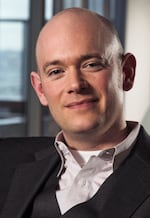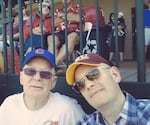
A large home with a white picket fence is at the heart of the mythology around the "American Dream."
Mark Goebel/Flickr
What do we mean when we talk about achieving the "American Dream"?
Who is we? And how did we come up with those ideas? Is the dream still relevant today? Those are all questions we're exploring in conversations with Oregonians leading up to the November 2016 election. We've been gathering survey responses and talking with people on Think Out Loud to get a variety of perspectives on the "American Dream."

Futurist Brian David Johnson is interviewing people around the country about "the future of the American Dream."
Antonio Tatum
Oregonian Brian David Johnson is a futurist, formerly of Intel, now with Arizona State University. For the last year and a half, he's been exploring what people all over the country think about American Dream with an eye to, you guessed it, the future.
"The way you change the future," Johnson told us in our interview, "is you change the story that people tell themselves about the future that they're going to live in."
The articulation of the white-picket-fence American Dream, he says, is rooted firmly in the last century, dating back to the desperation so many Americans experienced in the Great Depression.
“But then, it was almost as if you turned backwards and you could say, 'Oh, well there's this dream of what you could achieve in America.' ... You could see this idea, but the name and the phrase itself is a 20th century, almost-marketing slogan.”
Fast forward to today, Johnson says and: "It seems to be kind of baked into American's DNA ... You can pull yourself up by your own bootstraps. That you have the ability to better yourself through your own hard work."
How many people still believe that?
Brian David Johnson says he asked that question, too. He talked to thousands of people in one-on-one interviews and in town halls across the country — some with with as many as a thousand attendees.
"When people talk about the past, the history of the American Dream, everybody sees it that way," Johnson says. "They sort of see it that bootstrapping way that you can kind of pull yourself up. Now when you look at the future of it, people are split. And it's really spread, really, really wide."

Brian David Johnson with his dad at a baseball game in 2016.
Courtesy of Brian David Johnson
Portlander Cynthia Coleman responded to our survey. She describes herself as bi-racial with Native American roots.
“For my ancestors—the nation's First Americans—the American Dream meant that, in order to survive, you must renounce all you hold dear: your very values and core beliefs, what makes you who you are, and forge an identity and a life that is foreign. My observation is that, for American Indians who are asked, 'What does the American Dream mean to you?' you will find that some of us consider the dream as adopting a false identity and ideology in order to merely survive.”
Jeff Nicol from Hood River says his American Dream has shifted from a focus on unlimited opportunity to: "One where I just want to know my most basic needs are assured. Specifically, I want to know that I'd never be homeless and that I will have healthcare."
And Cooper Morrow from Portland says he's done some thinking about the opportunities he's had in the United States of America as a white male. "I've realized more clearly how advantaged I've been," he says, "thanks to my random set of parents, country, etc. I didn't have to do much to succeed … the American dream is drifting away for many and increasing in difficulty to achieve. "
You can take our American Dream survey, find out more about Brian David Johnson's national project about The Future of The American Dream. And be sure to catch our series of conversations with Oregonians on Think Out Loud on the air or live online weekdays at noon and 8 p.m. — or by signing up for our podcast.
